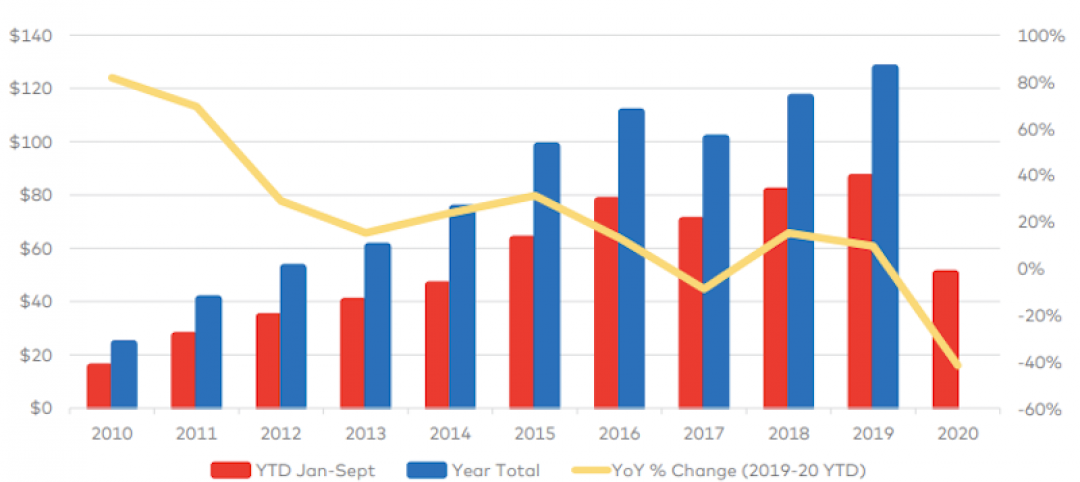Commercial construction spending in the second quarter of 2017 increased 13% from the same period last year and office construction rose 11%, according to the latest Marcum Commercial Construction Index. However, these bright spots contrast with a decline of 3.1% in overall nonresidential construction spending in June year-over-year and a monthly drop of 2.0% from May 2017. The index is produced by the Construction Services Group of Marcum LLP, a national accounting and advisory firm.
Anirban Basu, the report’s author, attributes the relative strength of the commercial and office subsectors to the ecommerce boom. He also notes that June spending in communication construction increased 4.9% year-over-year and 2.8% from May 2017. The only other subsector to record a gain was health care, with a 2.8% annualized improvement, although monthly results in the sector declined 0.2% in June.
“With interest rates remaining near rock-bottom levels, investors have been chased up the risk spectrum, including into commercial real estate. That has helped to raise property values and prompt new construction. These dynamics have also helped lift industry backlog and supported reasonably solid profit margins,” Mr. Basu wrote.
Spending in all 12 of the remaining nonresidential construction subsectors retreated on both an annualized and monthly basis. The largest declines came in public sector spending, including conservation and development (-20.6% and -7.3%, respectively), sewage and waste disposal (-16.8% and -2.4%), and water supply (-16.4% and -3.7%).
“The infrastructure boom we have been waiting for has not arrived as of yet. Business attitudes and the business environment and confidence remain high for the moment. Backlogs in the private sector are healthy. Investment is robust. It’s my hope that we can turn some of this momentum towards infrastructure, sooner rather than later,” said Joseph Natarelli, national leader of Marcum’s Construction Services Group and an office managing partner in New Haven, Connecticut.
Current economic trends in the construction industry will be discussed in depth at the upcoming annual Marcum Construction Summits in Ft. Lauderdale, Fla., on September 7; New Haven, Conn., on September 27; and New York City on October 23.
For the complete Marcum Commercial Construction Index, visit www.marcumllp.com.
Related Stories
Market Data | Jan 5, 2021
Barely one-third of metros add construction jobs in latest 12 months
Dwindling list of project starts forces contractors to lay off workers.
Market Data | Jan 4, 2021
Nonresidential construction spending shrinks further in November
Many commercial projects languish, even while homebuilding soars.
Market Data | Dec 29, 2020
Multifamily transactions drop sharply in 2020, according to special report from Yardi Matrix
Sales completions at end of Q3 were down over 41 percent from the same period a year ago.
Market Data | Dec 28, 2020
New coronavirus recovery measure will provide some needed relief for contractors coping with project cancellations, falling demand
Measure’s modest amount of funding for infrastructure projects and clarification that PPP loans may not be taxed will help offset some of the challenges facing the construction industry.
Market Data | Dec 28, 2020
Construction employment trails pre-pandemic levels in 35 states despite gains in industry jobs from October to November in 31 states
New York and Vermont record worst February-November losses, Virginia has largest pickup.
Market Data | Dec 16, 2020
Architecture billings lose ground in November
The pace of decline during November accelerated from October, posting an Architecture Billings Index (ABI) score of 46.3 from 47.5.
AEC Tech | Dec 8, 2020
COVID-19 affects the industry’s adoption of ConTech in different ways
A new JLL report assesses which tech options got a pandemic “boost.”
Market Data | Dec 7, 2020
Construction sector adds 27,000 jobs in November
Project cancellations, looming PPP tax bill will undercut future job gains.
Market Data | Dec 3, 2020
Only 30% of metro areas add construction jobs in latest 12 months
Widespread project postponements and cancellations force layoffs.
Market Data | Dec 2, 2020
New Passive House standards offers prescriptive path that reduces costs
Eliminates requirement for a Passive House consultant and attendant modeling.
















